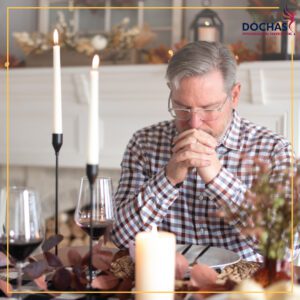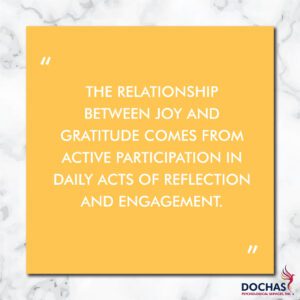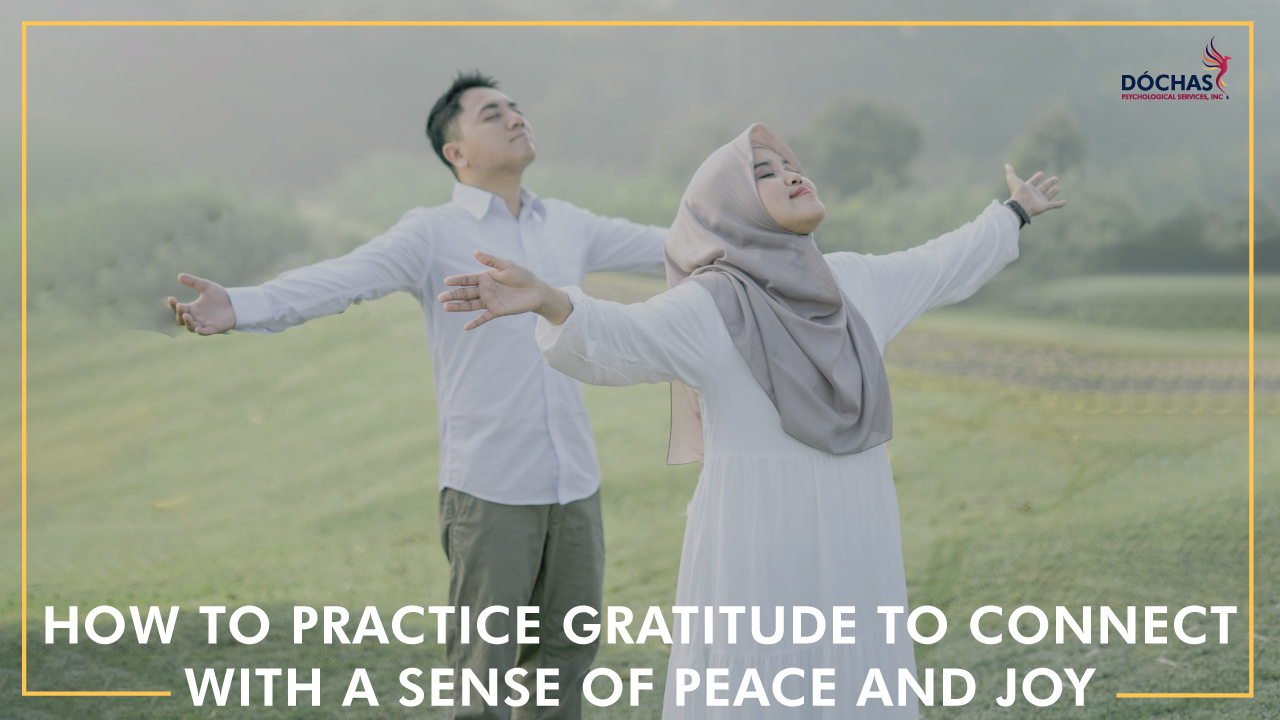Can you believe it’s almost Thanksgiving already? It’s Sarah here on the Dóchas blog today, and I’m going to talk about how to practice gratitude.
Can I take you on a little journey into the space where the warm and fuzzies live? It is cozy and begins with pausing for a moment and embracing all that we are and have received. “Warm and fuzzies” find it hard to exist when the wind blows hard, and the rain is on our faces. Hence, a gratitude trip begins with ducking into a figurative cove, pulling your imaginary blankets around your shoulders and connecting with a sense of safety.

Gratitude flows through us as emotion and can become a mood when we tap into it. It is true that often as we reflect on our lived experiences and adverse events, our mindset focuses on the barriers we face. If we turn to gratitude, we will notice the benefits we receive from life.
Using intentional gratitude practices regularly can shift depressive emotions by activating feel-good neurochemicals. This flush of fuzzy feelings (oxytocin, serotonin, and dopamine) activates parts of the brain where reward and relationships reside. Gratitude research studied brainwaves of these social connections during gift exchanges and found increased brain activity that created Theta brainwaves during and after the giving and receiving gifts. Theta brainwaves are relaxing states that move the brain’s frequency away from beta waves, where stress lives. In this state of gratitude, our brains shift to a place where stress cannot compete, and mental wellness thrives.
This cozy little quest of gratitude, if we choose to practice it, ends with the mental wellness emotion of joy. The relationship between joy and gratitude comes from active participation in daily acts of reflection and engagement, which means saying thank you to those in our lives and acknowledging kind acts. The more we practice gratitude, the more we can harness joy, improve our relationships, and shift how we experience the world.

But how do we practice gratitude? Here are a few tips to tune into these feelings:
Practical Tips
Connect to yourself
Place a hand palm down on the belly and the other hand on the heart space. Take a deep breath in… followed by a long sigh while thanking your body for carrying you through the world.
Be Mindful
Another tip is to grow in your awareness of what you are grateful for. One way to do this is to use a gratitude journal listing three things you are grateful for each day
Connect with your food
Take a moment while you eat to acknowledge your appreciation for the people who farmed, transported, prepared, and cooked the food you are about to eat.
Connect with others
Lastly, take the time to connect with others. Hold the hand of another person, look them in the eye and tell them why they are important to you. Write thank you cards in response to things others have done for you. List 30 people who have influenced your life, to boost your awareness of what you are grateful for. Or host a gift exchange as a way for your circle to connect with each other.
This endeavour to regularly connect with a sense of peace and joy through gratitude requires practice. When we are feeling low or stressed, it can be hard to find shelter from the storm of stress. If you would like assistance in finding the vulnerability that brings gratitude, you can find a safe space at Dóchas where one of the practitioners can assist you. You can reach out to us here by calling us at 780 446 0300 or emailing info@dochaspsychologicalservices.com.
Resources
Balconi, M., Fronda, G., & Vanutelli, M. E. (2020). When gratitude and cooperation between friends affect inter-brain connectivity for EEG. BMC Neuroscience, 21(1), 1–12. https://doi.org/10.1186/s12868-020-00563-7
Glenn Ryan Fox, Jonas eKaplan, Hanna eDamasio, & Antonio eDamasio. (2015). Neural Correlates of Gratitude. Frontiers in Psychology, 6. https://doi.org/10.3389/fpsyg.2015.01491
Brown, B. (2013). DARING GREATLY: How the Courage to Be Vulnerable Transforms the Way We Live, Love, Parent and Lead. London, England: Portfolio Penguin.
About Dóchas Psychological
Dóchas Psychological Services is a well-established and trusted therapy clinic located in Spruce Grove, Alberta. At Dóchas we value the idea that everyone deserves a safe space. Through connection and education, our team works hard to build a trustworthy relationship with each of our clients. It is our goal to create a community for our clients to feel like they belong.
Disclaimer
Information provided through Dóchas Psychological Services blogs or vlogs is meant for educational purposes only. They are NOT medical or mental health advice. You can read more about our disclaimer here.








